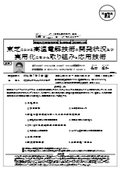Efforts and applied technologies toward practical use: High-temperature steam electrolysis method for hydrogen production using solid oxides.
Our company will hold a seminar on "The Development Status of High-Temperature Electrolysis Technology at Toshiba." Toshiba Energy Systems is engaged in hydrogen business and is developing hydrogen production systems as one of its initiatives. There are various types of hydrogen production technologies, but we will focus on the high-temperature steam electrolysis method, which is the most efficient. We will provide detailed explanations of the research and development status, efforts toward practical application, and related technologies. 【Seminar Details】 ■ Date and Time: July 5, 2024 (Friday) 13:30 - 15:30 (Doors open at 13:00) ■ Venue: JPI Conference Square ■ Address: 5-2-32 Minamiazabu, Minato-ku, Tokyo, Kowa Hiroo Building ■ Participation Method: In-person, live streaming, archived streaming ■ Speaker: Toshiba Energy Systems Corporation Energy Systems Technology Development Center Chemical Technology Development Department, Carbon Capture & Recycling Group Expert Mr. Norikazu Nagata *For more details, please refer to the PDF document or feel free to contact us.
Inquire About This Product
basic information
【Lecture Items】 ■Company Introduction ■High-Efficiency Hydrogen Production Using High-Temperature Steam Electrolysis ■Development Status of CO2/H2O Co-Electrolysis Technology ■Future Developments ■Related Q&A ■Business Card and Information Exchange Meeting *For more details, please refer to the PDF document or feel free to contact us.
Price range
Delivery Time
Applications/Examples of results
For more details, please refer to the PDF document or feel free to contact us.
catalog(1)
Download All CatalogsCompany information
JPI Corporation (Japan Planning Institute) has been providing valuable information for executives and senior management involved in the execution of national policies and national projects, supporting the dissemination of knowledge as a 'bridge of wisdom' between 'politics,' 'government,' and 'the public' in a limited-participant, real seminar format for half a century, aiming to create national knowledge.











